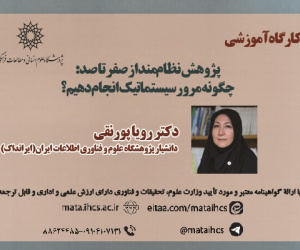معنای حکمت و اقسام آن
آرشیو
چکیده
در این مقاله با اشاره به معانی مختلف حکمت مانند جمع میان علم و عمل، به معنای اصطلاحی آن که «دانش فلسفی » است پرداخته ایم. «حکمت عملی» به عنوان جزئی از این دانش فلسفی، ماهیت اکتشافی دارد و دلالتی بر التزام اخلاقی ندارد. ممکن است کسی حکیم عملی به این معنا باشد، ولی حیات اخلاقی نداشته باشد. معنای حکمت عملی در نظر فیلسوفان مختلف توضیح داده شده است و سپس با توجه به بیان برخی از فیلسوفان مسلمان که حکمت نظری را مربوط به «هست ها» و حکمت عملی را مربوط به «باید ها» می دانند، به امکان تفسیر آن در پرتو مسئلهٔ «باید و هست» هیوم پرداخته شده است. این امکان رد شده و بر ماهیت شناختیِ اخلاق تأکید شده است. در پایان نسبت «عقل عملی» به مثابه یک قوّهٔ ادراکی و «حکمت عملی» به مثابه یک دانش فلسفی بررسی شده است تا این اشتباه که این حکمت عملی لزوماً نتیجه «عقل عملی» است رفع شود.The Meaning of Hikmah (Wisdom) and its divisions
In this paper, referring to the different meanings of wisdom, such as the combination of theory and practice, we have discussed the idiomatic meaning of wisdom as “philosophical knowledge”. “Practical wisdom” as a part of this philosophical knowledge is exploratory and does not imply moral commitment. Someone can be practical wise in this sense, but he does not have an ethical life. The meaning of “practical wisdom” has been explained in the works of different philosophers. Because some Muslim philosophers thought that “theoretical wisdom” concerned with the prepositions with the conjunction “is” and "practical wisdom" concerned with the conjunction “should”, the possibility of its interpretation in the light of Hume’s “ought” and “is" problem has been discussed. This possibility has been rejected and the cognitive nature of ethics has been emphasized. In the end, the relationship between “practical reason” as a faculty of soul and “practical wisdom” as a branch of philosophical knowledge has been examined to remove the mistake that the latter is necessarily the result of “practical reason”..






